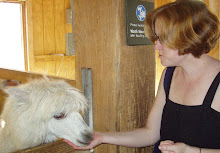Ah yes, more of the seven year rule. I can't seem to get enough of that rule these days.
All of my thinking about the seven year rule has become jumbled. I am very clear on the rule as an actor. As I've stated in previous posts, I have found the seven year rule to be useful when working on a role. Distance from a particular emotional trauma helps me to have control over my choices- it allows me physical freedom and emotional objectivity as I piece a character's life together. However, things get a little murky when I consider the seven year rule as it pertains to my writing.
Should the seven year rule apply to my writing as well? Granted, writing is a private activity and I can prune and edit for as long as I wish (usually not very long at all- I'm not the most patient writer.) and it is okay if I hit a sore spot and cry myself drier than the Mojave. I can always come back to it and no one would be any the wiser. Or would they?
One of my biggest concerns is self-indulgence. Self-indulgence can color an artist's ability to effectively communicate ideas. When a story becomes more about eliciting an emotional response than it is about challenging assumptions and asking hard questions then the story itself becomes a masturbatory exercise. Emotional responses do not make great stories. How many people have you ever seen choke up at the mention of Sophie's Choice only to admit that it was "just okay"? The manipulation of circumstances brings about an overwhelming amount of emotion, but if there are no insights, no questions, no challenges, we learn nothing from the experience beyond "wow, that made me sad". So, is it possible to challenge yourself as a writer to write something immediate to your experience without drowning in it? Or is that simply journaling for the public?
There is something quite valuable in journals. I just wonder if they should be for public consumption. Distance and time do allow for humor to develop, and within that humor comes palatable insight. By that, I mean that humor is one of the most effective ways to communicate difficult ideas. Humor disarms the reader/ viewer and difficult messages can often sneak in and burrow themselves into the audience member's subconscious- allowing them to take in something that may have been too offensive or too painful were it delivered in a more "serious" fashion. My favorite example of this is that Huckleberry Finn was written in Connecticut. Time and distance allow us to see what is universal and what is idiosyncratic about the characters, the time, and the place about which we are writing. This is the beginning of insight, meaning and purpose.
But what about immediacy? What about chronicling the experience in real time? Can there be insight in that? Or should the insight be allowed to deepen and mellow in complexity like a fine wine? How can we tell the difference? How do we know when is the right time to write what?
A friend of mine recently suggested that I write about pregnancy. He had complimented my "glow" and I brushed off the compliment with a cynical remark about how the "glow" was simply a by-product of my body's elevated blood levels and nothing to get too excited about as if it were a reflection of my good taste and fine upbringing. He laughed and told me that other people would find my thoughts on pregnancy entertaining. To be honest, I have been thinking about writing about pregnancy and motherhood for years. Although the perspective I would want to explore would be more about how my parents' influences, their generation, my mother's illness, and my life experiences have made me into the wife/mother/daughter that I am- or more specifically- think that I am. I have a lot of questions about the patterns I've avoided and the patterns I've continued in my life and I believe there is a fictional counterpart to me that could make a compelling character. But when will my writing about that be most effective? Now when I'm in the thick of the experience? Or later when I won't be so invested in taking myself so seriously? Or- would it just be a good exercise for me to write with the intent of keeping my eyes open to my own absurdity?
I have known writers who can do that, and do that quite effectively. Most notably, my good friend Joseph Scrimshaw has made a career of writing in the immediate. His work is riddled with questions about his current struggles in life and art. He just happens to be extraordinarily witty- so you might miss the deeper questions he asks of himself while your beer comes out your nose. (Oh, and there IS beer. There is ALWAYS beer...) That's okay. I think those questions then burrow into your brain like a horrible parasite and then resurface later. I'd be satisfied with that, but I don't quite trust myself to be able to pull that off.
While I am confident in my knowledge and understanding of the application of the seven year rule as an actor- I am not so sure about how to use it as a writer. The only way for me to really tell is to test it.
Over and over and over again.
Friday, May 02, 2008
The Seven Year Rule - Writer's Edition
Labels:
Acting,
Immediacy,
Joseph Scrimshaw,
The Seven Year Rule,
writing
Subscribe to:
Post Comments (Atom)



No comments:
Post a Comment